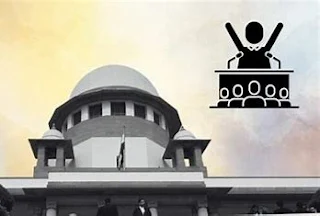Judicial Duty to Safeguard Freedom of Expression Regardless of Content: Supreme Court's Stance
Judicial Duty to Safeguard Freedom of Expression Regardless of Content: Supreme Court's Stance
Author: Abhishek Jat, Advocate
Introduction
In a seminal
judgment delivered on March 28, 2025, the Supreme Court of India in Imran
Pratapgadhi v. State of Gujarat (2025 INSC 410) reinforced the
inviolability of freedom of speech and expression under Article 19(1)(a) of the
Constitution. The case arose from the criminal prosecution of a Member of
Parliament for reciting a poem deemed inflammatory by the Gujarat Police. The
Court’s ruling not only quashed the FIR but also laid down critical principles
to prevent the misuse of penal laws to suppress dissent, emphasizing the
judiciary’s role as the ultimate protector of constitutional rights.
Factual Background and Procedural History
The appellant,
Imran Pratapgadhi, a Rajya Sabha MP, attended a public event where he recited a
poem advocating non-violent resistance to injustice. The poem, which contained
lines like "If the fight for our rights is met with injustice, we
will meet that injustice with love," was shared on social media.
A complaint was filed alleging that the poem incited communal hatred and
threatened national unity, leading to an FIR under Sections 196, 197(1), 299,
and 302 of the Bharatiya Nyaya Sanhita (BNS), 2023. The Gujarat High Court
refused to quash the FIR, citing the preliminary stage of investigation. On
appeal, the Supreme Court scrutinized whether the poem’s content and context
justified the invocation of penal provisions.
The Supreme Court’s Legal Reasoning
1. Freedom of Speech as a Fundamental
Right
The Court began
by reaffirming the centrality of free speech in a democracy, drawing from
precedents like Shreya Singhal v. Union of India (2015)
and Ramesh v. Union of India (1988). It underscored that
Article 19(1)(a) protects not just palatable speech but also expressions that
challenge authority or provoke thought. The Bench, comprising Justices Abhay S.
Oka and Ujjal Bhuyan, observed: "Democracy thrives on dissent. The
right to critique, even in strong terms, is not a crime but a necessity for
societal progress." The Court rejected the notion that abstract
or metaphorical language in poetry could be construed as incitement,
emphasizing that artistic expression must be assessed holistically rather than
through isolated phrases.
2. Absence of Mens Rea and Communal Intent
A key facet of
the judgment was the Court’s insistence on mens rea (guilty
mind) for offenses like promoting enmity (Section 196, BNS). Relying on Manzar
Sayeed Khan v. State of Maharashtra (2007), the Bench noted that
penalizing speech requires proof of intent to cause disharmony. The poem, when
read in its entirety, conveyed a message of love and resilience, with no
reference to religion, caste, or community. The Court adopted the standard
of "reasonable, strong-minded individuals"—a test
formulated by Justice Vivian Bose in Bhagwati Charan Shukla (1946)—to
evaluate its impact. It cautioned against hypersensitive interpretations,
stating: "The law cannot cater to those who perceive danger in
every dissenting voice."
3. Procedural Safeguards Against Frivolous
FIRs
The judgment
provided a nuanced interpretation of Section 173(3) of the Bharatiya Nagarik
Suraksha Sanhita (BNSS), which permits preliminary inquiries for cognizable
offenses punishable by 3–7 years. Unlike the CrPC, the BNSS allows such
inquiries even if the FIR discloses a cognizable offense, acting as a filter
against frivolous cases. The Court directed police to conduct such inquiries
where speech-related offenses are alleged, ensuring that freedom of expression
is not chilled by arbitrary arrests. It criticized the Gujarat Police for
registering the FIR without assessing the poem’s meaning, calling the
action "perverse and antithetical to constitutional values."
4. Judicial Duty to Intervene at the
Threshold
The Bench
rebuked the High Court for deferring to the "nascent stage of
investigation" as a reason to deny relief. Citing State
of Haryana v. Bhajan Lal (1992), it clarified that courts can quash
FIRs in limine if the allegations, even if true, do not constitute an offense.
The judgment admonished judicial reluctance in such cases, stating: "When
fundamental rights are trampled, courts cannot remain silent spectators. To do
so would betray the Constitution."
Broader Implications for Democracy and
Governance
The ruling carries profound implications
for India’s democratic fabric:
- Artistic Freedom: The
Court recognized poetry, satire, and art as vital to a vibrant democracy,
shielding them from knee-jerk criminalization.
- Executive Accountability: It
castigated law enforcement for insensitivity to constitutional rights,
urging training programs to sensitize police on free speech.
- Role of Constitutional Courts: The
judgment positioned the judiciary as the "first line of
defense" against majoritarian excesses, echoing Dr. B.R.
Ambedkar’s vision of courts as custodians of liberty.
Conclusion
The Imran
Pratapgadhi case is a clarion call for preserving India’s pluralistic
ethos. By invalidating the FIR, the Supreme Court sent a clear message: in a
democracy, the state cannot weaponize laws to silence dissent. The judgment’s
emphasis on contextual interpretation, procedural safeguards, and judicial
vigilance sets a benchmark for future free speech cases. As the Court
poignantly noted, "75 years into our republic, we must trust our
democracy to withstand words—even uncomfortable ones."
Disclaimer:
This article is for informational purposes only and does not constitute legal
advice. Readers are advised to consult qualified legal professionals for
specific legal concerns.




Comments
Post a Comment